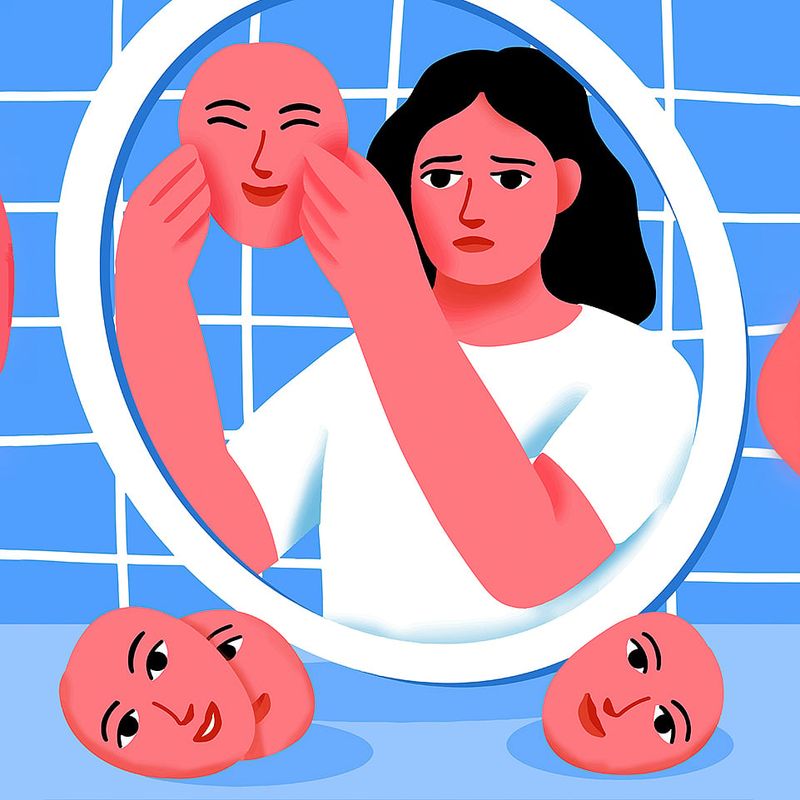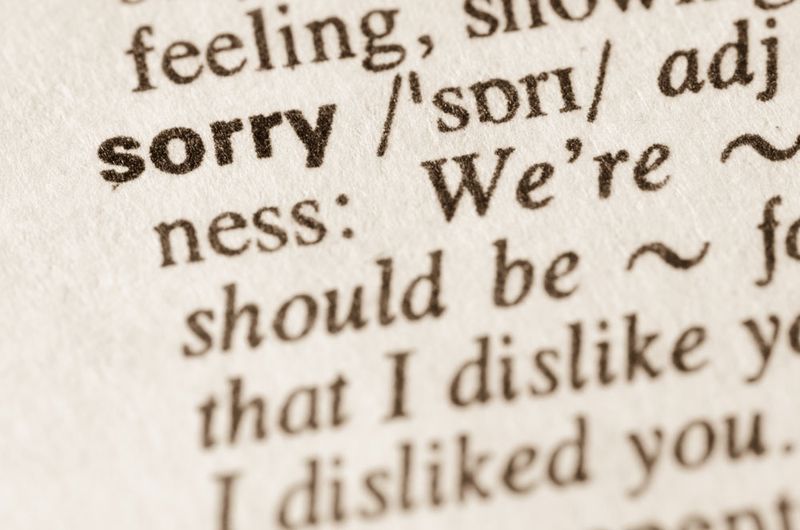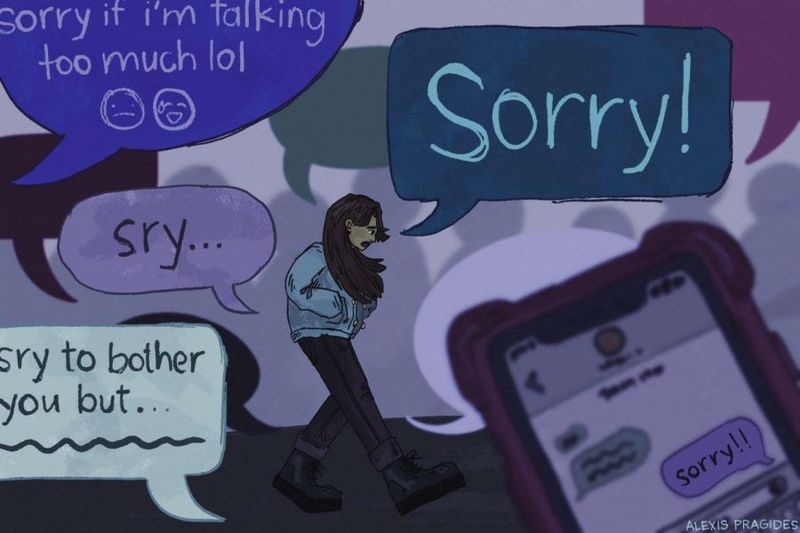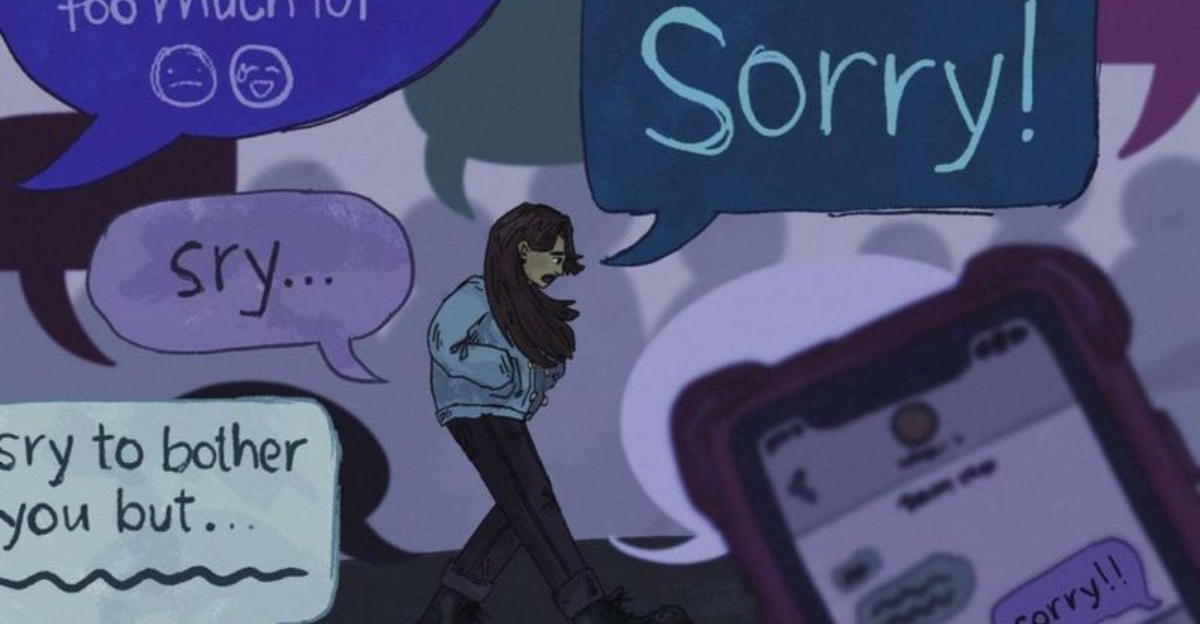17 Reasons You’re Over-Apologizing And How To Break Free
In today’s world, over-apologizing is a habit many of us struggle with. This blog post delves into 17 reasons behind this common reflex and offers insights on breaking free from it.
Each section explores a unique aspect of the over-apologizing habit, helping you understand its roots and providing practical solutions to overcome it. By identifying these triggers and learning how to respond differently, you can reclaim your voice and confidence.
1. You were taught to prioritize harmony over honesty

Growing up in a household where peace was prized might have instilled in you the habit of avoiding conflict at all costs. This upbringing often leads to prioritizing harmony over honesty, resulting in frequent apologies to maintain peace.
The pressure to keep everyone happy can make you feel that saying sorry is a quick way to diffuse tension. However, this mindset can undermine your true feelings and needs.
Breaking this cycle involves recognizing that honesty doesn’t always equate to discord. By practicing assertive communication, you can express your thoughts without feeling the need to apologize unnecessarily. Embrace the notion that your voice deserves to be heard as much as others’.
2. You confuse politeness with passiveness

Politeness is often mistaken for passiveness, especially when the line between the two blurs. Apologizing excessively can be a manifestation of this confusion, as you might believe that being overly polite means never causing discomfort.
However, this mindset can prevent you from asserting your own needs and boundaries. It’s essential to differentiate between genuine politeness and losing your voice altogether.
Empower yourself to speak up and hold your ground while maintaining respect for others. Learning the art of assertive politeness allows you to express your thoughts without feeling the need to apologize. Remember, it’s possible to be both courteous and confident without compromising your values.
3. You’ve been conditioned to make others comfortable first

From a young age, society often conditions individuals to prioritize others’ comfort over their own. This relentless pursuit of accommodating others can lead to over-apologizing as you constantly seek to prevent any discomfort.
Such behavior, while well-meaning, can erode your self-esteem and hinder genuine interactions. Understanding that your comfort matters equally is crucial in breaking this habit.
Begin by acknowledging your own feelings and needs as valid. Practice setting boundaries and communicating them clearly, even if it feels unfamiliar at first. This shift empowers you to engage authentically with others, free from the compulsion to apologize incessantly.
4. You fear being labeled difficult

The fear of being labeled as difficult often leads many to over-apologize. In work environments, this fear can become particularly pronounced, as you strive to be seen as agreeable and cooperative.
However, constantly apologizing to avoid this label can compromise your contributions and ideas. It’s essential to recognize that assertiveness doesn’t equate to being difficult.
Challenge this narrative by valuing your input and expressing it confidently. By reframing your perception of what it means to be assertive, you can reduce unnecessary apologies and maintain your professional integrity. Remember, your ideas are valuable, and it’s okay to stand by them without constantly apologizing.
5. You’re trying to soften your existence

In a world where boldness is often celebrated, you might feel the need to apologize as a way to soften your existence. This habit is rooted in the fear of taking up too much space or being perceived as too assertive.
However, constantly apologizing can diminish your presence and self-worth. Embrace the idea that your existence doesn’t need to be softened or minimized to be accepted.
Instead of downplaying yourself, practice self-affirmation and recognize your right to be bold and assertive. Breaking free from this pattern involves celebrating your individuality and understanding that you don’t need to apologize for being who you are.
6. You think taking up space needs a disclaimer

Feeling like you need to apologize for taking up space is a common struggle for many. This mindset often stems from a fear of being intrusive or unwanted in shared spaces.
However, apologizing for your presence can undermine your confidence and sense of belonging. Remind yourself that you deserve to occupy space just as much as anyone else.
Challenge this belief by practicing self-assuredness and occupying spaces with confidence. Embrace the notion that your presence is valuable and doesn’t require a disclaimer. By doing so, you’ll find the courage to engage fully and authentically without the need for constant apologies.
7. You’re scared of being misunderstood

The fear of being misunderstood can trigger excessive apologies, as you strive to clarify your intentions and avoid misinterpretation. This habit can lead to over-explaining and unnecessary apologies.
However, constant apologizing doesn’t guarantee understanding. Instead, it can dilute your message and diminish your confidence.
Focus on clear and concise communication, trusting that your intentions will be understood by those who matter. Embrace the possibility of misunderstandings as part of human interaction, allowing yourself to communicate without the need for excessive apologies.
8. You use apologies to avoid conflict

Using apologies as a shield to avoid conflict is a common tactic. While it may prevent immediate confrontations, it can lead to unresolved issues and resentment over time.
Constantly saying sorry to avoid conflict can undermine your authentic expression and hinder problem-solving. It’s crucial to recognize that conflict isn’t inherently negative and can lead to growth and understanding.
Practice addressing conflicts directly and constructively, without resorting to apologies as a default. This approach empowers you to tackle issues head-on, fostering healthier relationships and reducing the need for unnecessary apologies.
9. You say sorry for things you can’t control

Apologizing for things beyond your control, like the weather or other people’s actions, is a common habit that stems from a desire to take responsibility for situations.
However, this mindset can lead to unnecessary stress and guilt. It’s important to differentiate between situations you can influence and those you cannot.
Shift your focus to expressing empathy without taking on unwarranted responsibility. By doing so, you free yourself from the burden of apologizing for everything and embrace a healthier outlook on responsibility.
10. You apologize for your emotions

Apologizing for your emotions is often rooted in the belief that they are inconvenient or burdensome to others. This habit can lead to suppressing feelings and a lack of emotional authenticity.
However, emotions are a natural and vital part of human experience. Embrace them without apology, knowing that expressing emotions is a sign of strength, not weakness.
Practice validating your emotions and sharing them openly with trusted individuals. By doing so, you foster deeper connections and reduce the compulsion to apologize for how you feel. Remember, your emotions are valid and deserving of acknowledgment.
11. You’ve linked self-worth with approval

Linking self-worth to external approval can lead to over-apologizing in an attempt to maintain favor with others. This reliance on validation can diminish your sense of self and authenticity.
Recognize that your worth is intrinsic, not based on others’ opinions. Embrace self-acceptance and cultivate inner confidence, reducing the need to seek constant approval.
Focus on aligning your actions with your values, rather than apologizing to gain approval. By doing so, you develop a stronger sense of self-worth and authenticity, freeing yourself from the cycle of over-apologizing.
12. You use “I’m sorry” as a filler instead of “excuse me” or “thanks”

Using “I’m sorry” as a filler phrase in place of “excuse me” or “thanks” is a habit many fall into. This automatic response can dilute the meaning of an apology and reduce its impact.
Recognize when you’re using apologies as fillers and consciously replace them with more appropriate phrases. This simple change can enhance your communication and reduce unnecessary apologies.
By being mindful of your language, you can express gratitude or request permission without defaulting to “I’m sorry.” This shift empowers you to communicate more effectively, reserving apologies for situations that truly warrant them.
13. You’re surrounded by chronic over-apologizers

Being surrounded by chronic over-apologizers can normalize the habit and make it challenging to break. This environment reinforces the belief that frequent apologies are necessary in everyday interactions.
It’s important to recognize how this influence affects your behavior. Evaluate your own communication patterns and strive to set a different example.
Encourage open dialogue with others about the impact of over-apologizing and explore alternative ways to communicate. By fostering awareness and change within your social circle, you can collectively move towards more authentic and confident interactions.
14. You fear sounding assertive, even when you’re right

The fear of sounding assertive can hinder your ability to express yourself, even when you’re confident in your position. This fear often leads to over-apologizing to soften your message.
However, assertiveness is not synonymous with aggression. It’s a vital communication skill that allows you to express your ideas confidently and respectfully.
Challenge the notion that assertiveness is negative by practicing it in small, supportive environments. This practice helps build confidence, enabling you to convey your ideas without the need for excessive apologies.
15. You default to it in emails and texts out of habit

Apologizing in emails and texts can become a habitual reflex, often used to soften messages or fill silence. This pattern can dilute the impact of genuine apologies and weaken your communication.
Recognize when you’re using apologies unnecessarily in written communication. Replace them with clear, direct language that conveys your message more effectively.
By being mindful of your language, you can enhance your written communication and reserve apologies for situations that genuinely require them. This shift empowers you to communicate more confidently and authentically online.
16. You’re trying to preempt criticism

Over-apologizing to preempt criticism is a common defensive tactic. By saying sorry in advance, you might hope to soften potential negative feedback.
However, this approach can undermine your confidence and weaken your stance. Instead of apologizing for anticipated criticism, focus on presenting your ideas clearly and confidently.
Embrace constructive feedback as an opportunity for growth, and trust in your ability to handle criticism without the need for constant apologies. This mindset fosters resilience and empowers you to engage more authentically with others.
17. You don’t yet trust your right to just be

Trusting your right to simply be who you are is a journey that many struggle with. Over-apologizing often emerges from a lack of self-trust and confidence in your own existence.
Understanding that you have inherent worth and a right to occupy space is essential in breaking this habit. Practice self-compassion and affirm your right to be without needing validation from others.
By cultivating self-trust and embracing your individuality, you can break free from the compulsion to apologize for merely existing. This shift empowers you to engage with the world authentically and confidently.







